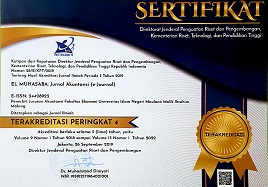Pengaruh Bias Kognitif terhadap Pengambilan Keputusan Investasi di Platform Digital pada Generasi Y dan Z
Abstract
Method: This study uses a quantitative descriptive approach. The sampling method used is convenience sampling with the criteria of the age range 18-35 years. This study used multiple regression tests to see the effect of independent and dependent variables, and uses the SPSS 25 analysis tool.
Results: The results of this study indicate that cognitive dissonance bias and overconfidence have a significant negative effect on investment decisions, and illusion of control has a significant positive effect on investment decisions.
Implications: This research can provide information related to cognitive biases in making investment-related decisions, especially for investors so that they are not wrong in making investment decisions.
Novelty: This study uses a sample of Y and Z generations in Malang City, and looks at how cognitive biases are affected through digital investment platforms.
Keywords
Full Text:
PDFReferences
Ainun, A. N. A. (2019). Pengaruh Illusion Of Control, Overconfidence dan Emosi Terhadap Keputusan Investasi Pada Investor Muda di Kota Makassar. Skripsi, 133.
Anam, C. (2023). Investor Pasar Modal di Wilayah OJK Malang Mencapai 212.592 Orang. https://surabaya.bisnis.com/read/20230110/532/1616859/investor-pasar-modal-di-wilayah-ojk-malang-mencapai-212592-orang.
Bayu, D. (2022). Ini 8 Aplikasi Investasi Terfavorit di Indonesia, Apa Saja? https://dataindonesia.id/ekonomi-digital/detail/ini-8-aplikasi-investasi-terfavorit-di-indonesia-apa-saja.
Claudia, N. (2020). Pengaruh Bias Kognitif terhadap Pengambilan Keputusan Investasi Saham pada Generazi Z di Surabaya dengan Finansial Literasi sebagai Variabel Moderasi.
Fadilah, M. N., Indriwan, N., Khoirunnisa, N., & Mulyantini, S. (2022). Review Faktor Penentu 2017). Kebutuhan Manusia dalam Pandangan Ekonomi Kapitalis dan Ekonomi Islam. Jurnal Ilmu Syariah Al-Maslahah, 13(1), 1-20. https://doi.org/10.24260/almaslahah.v13i1.921
Hair, J.F., Black, W.C., Babin, B.J. and Anderson, R.E. (2014). Multivariate Data Analysis. 7th Edition, Pearson Education, Upper Saddle River.
Hamonangan, Y. E. & Wisuda H. P. (2022). Pemahaman Investasi pada Generasi Milenial di Indonesia. Jurnal Ilman: Jurnal Ilmu Manajemen, 10(2), 29-40. https://journals.stimsukmamedan.ac.id/index.php/ilman
Hatane, S. E., Setiono, F. J., Setiawan, F. F., Semuel, H., & Mangoting, Y. (2021). Learning environment, students’ attitude and intention to enhance current knowledge in the context of choosing accounting career. Journal of Applied Research in Higher Education, 13(1), 79–97. https://doi.org/10.1108/JARHE-06-2019-0156
Hayati, R., Azmansyah, Suriyanti, L. H, & Irman, M. (2022). Bias Kognitif dalam Keputusan Investasi di Pekanbaru. Jurnal Akuntansi & Ekonomika, 12(1), 64-73. http://ejurnal.umri.ac.id/index.php/jae
Indraswari, D. L. (2022). Geliat Kaum Muda Berinvestasi. https://www.kompas.id/baca/telaah/2022/03/28/geliat-kaum-muda-berinvestasi.
Karima, N. A. & Sari, N. R. (2022). Pengaruh Literasi Keuangan, Illusion Of Control dan Overconfidence terhadap Keputusan Investasi Keputusan Investasi pada Generasi Z & Millenial. Jurnal Ilmiah Manajemen dan Kewirausahaan, 2(1), 17-29. http://journal.politeknik-pratama.ac.id/index.php/IMKGunawijaya, R. (pada Investor di Tulungagung. Budgeting: Journal of Business, Management and Accounting, 4(1), 74-88.
Kartini, K. & Nugraha, N. F. (2015). Pengaruh Illusions of Control, Overconfidence dan Emotion terhadap Pengambilan Keputusan Investasi pada Investor di Yogyakarta. Jurnal Ajie, 4(2), 114–122. https://doi.org/10.20885/ajie.vol4.iss2.art6
Khanza, P. R. (2022). Pengaruh Cognitive Dissonance Bias, Hindsight Bias, Overconfidence Bias, dan Self-Control Bias terhadap Keputusan Investasi Cryptocurrency. (Skripsi Sarjana, Universitas Dinamika).
Khusna, A. A. (2021). Pengaruh Confirmation Bias, Self- Attribution Bias, Overconfidence Bias, Cognitive Dissonance Bias, dan Herding Bias terhadap Pengambilan Keputusan Investor Pemula dalam Investasi Saham di Masa Pandemi Covid-19. (Skripsi Sarjana, Universitas Islam Indonesia, Yogyakarta).
Leiwakabessy, A., Patty, M., & Titioka, B. M. (2022). Faktor Psikologis Investor Millenial Dalam Pengambilan Keputusan Investasi Saham. 22(02), 494–505.
Loris, R. P. (2020). Pengaruh Representativeness, Availability, Anchoring, Risk Perception Terhadap Keputusan Investasi Pada Investor Syariah. Skripsi.
Muhammad Vicky, V. (2021). Pengaruh Financial Literacy, Illusion Of Control, Overconfidance, Risk Perception, Risk Tolerance Dan Experienced Regret Terhadap Keputusan Investasi (Studi Pada Galeri Investasi UIN Suska Riau).
Nadila, S. M. (2022). Generasi Z: Si Paling Healing vs Si Pembawa Perubahan. https://pmb.brin.go.id/generasi-z-si-paling-healing-vs-si-pembawa-perubahan.
Olivia, L. (2022). Platform Investasi Digital Bantu Naikkan Pendapatan. https://investor.id/finance/307584/platform-investasi-digital-bantu-naikkan-pendapatan.
Pompian, M. M. (2006). Behavioral Finance and Wealth Management: How to Build Optimal Portfolios that Account for Investor Biases. United States: Wiler Finance.
Pradhana, R. W. (2018). Pengaruh Financial Literacy, Cognitive Bias, Dan Emotional Bias Terhadap Keputusan Investasi (Studi Pada Investor Galeri Investasi Universitas Negeri Surabaya). Jurnal Ilmu Manajemen, 6(3), 108–117. https://jurnalmahasiswa.unesa.ac.id/index.php/jim/article/view/23849
Pradnyawati, N. L. P. E. & Sinarwati, N. K. (2022). Analisis Keputusan Investasi pada Generasi Millenial di Pasar Modal saat Pandemi Covid-19. Bisma: Jurnal Manajemen, 8(2), 428-437.
Rahmania Khanza, P., Tanuwijaya, H., Yanu, A., & Fianto, A. (2022). Pengaruh Cognitive Dissonance Bias, Hindsight Bias, Overconfidence Bias Dan Self-Control Bias Terhadap Keputusan Investasi Cryptocurrency. Jurnal Ilmu Manajemen Indonesia, 3(1), 1–15. www.coinmarketcap.com
Rakhmatullah, A. D. & Asandimitra, N. (2019). Pengaruh Overconfidence, Accounting Information, dan Behavioural Motivation terhadap Keputusan Investasi di Kota Surabaya. Jurnal Ilmu Manajemen, 7(3), 796-806.
Reichenbach, A., Bringmann, A., Reader, E. E., Pournaras, C. J., Rungger-Brändle, E., Riva, C. E., Hardarson, S. H., Stefansson, E., Yard, W. N., Newman, E. A., & Holmes, D. (2019). Analisis Pengaruh Overconfidence dan Risk Tolerance Terhadap Keputusan Investasi Pada Investor di Kota Bandar Lampung. Progress in Retinal and Eye Research, 561(3), S2–S3
Rosariana, B. (2021). Generasi “Milenial” dan Generasi “Kolonial.” https://www.djkn.kemenkeu.go.id/kpknl-pontianak/baca-artikel/14262/Generasi-Milenial-Dan-Generasi-Kolonial.html, diakses Mei 2023
Sari, R. J. (2019). Analisis Pengaruh Overconfidence dan Risk Tolerance Terhadap Keputusan Investasi Pada Investor di Kota Bandar Lampung. Progress in Retinal and Eye Research, 561(3), S2–S3.
Sari, R. N., & Damingun. (2021). Pengaruh Bias Overconfidence Terhadap Keputusan Investasi di Pasar Modal. Borneo Student Research, 2(3), 2072–2081.
Setiawan, Y. C., Atahau, A. D. R., & Robiyanto, R. (2018). Cognitive Dissonance Bias, Overconfidence Bias dan Herding Bias dalam Pengambilan Keputusan Investasi Saham. AFRE (Accounting and Financial Review), 1(1), 17–25. https://doi.org/10.26905/afr.v1i1.1745
Umairoh, P. (2012). Cognitive Bias Dan Emotional Bias Dalam Pengambilan Keputusan Investasi Portofolio Oleh: Pradiptianing Umairoh Nim : 212008104 Kertas Kerja.
Violeta, J., & Linawati, N. (2019). Pengaruh Anger Traits, Anxiety Traits, dan Faktor Demografi terhadap Keputusan Investasi. Jurnal Manajemen Pemasaran, 13(2), 89–96. https://doi.org/10.9744/pemasaran.13.2.89-96
Widya;, K. A., ; Z. B., & Hariadi, B. (2017). Study on Auditor’s Behavior In Using Information Technology For Auditing: Theory of Planned Behavior and Social Cognitive Theory Modification. Rjoas, 6(June), 250–258.
Wira, Y. S. (2023). Milenial Dominasi Tambahan Jumlah Investor di Kota Malang. https://radarmalang.jawapos.com/ekonomi-bisnis/31/03/2023/milenial-dominasi-tambahan-jumlah-investor-di-kota-malang/, diakses Mei 2023.
DOI: https://doi.org/10.18860/em.v15i1.22107
Refbacks
- There are currently no refbacks.
Editorial Office:
Megawati Soekarnoputri Building
Accounting Department, Faculty of Economics
Jln. Gajayana 50 Telp (0341) 558881
E-mail: elmuhasaba@uin-malang.ac.id
Universitas Islam Negeri Maulana Malik Ibrahim Malang
E-ISSN 2442-8922
P-ISSN 2086-1249

This work is licensed under a CC BY SA 4.0 International License


















